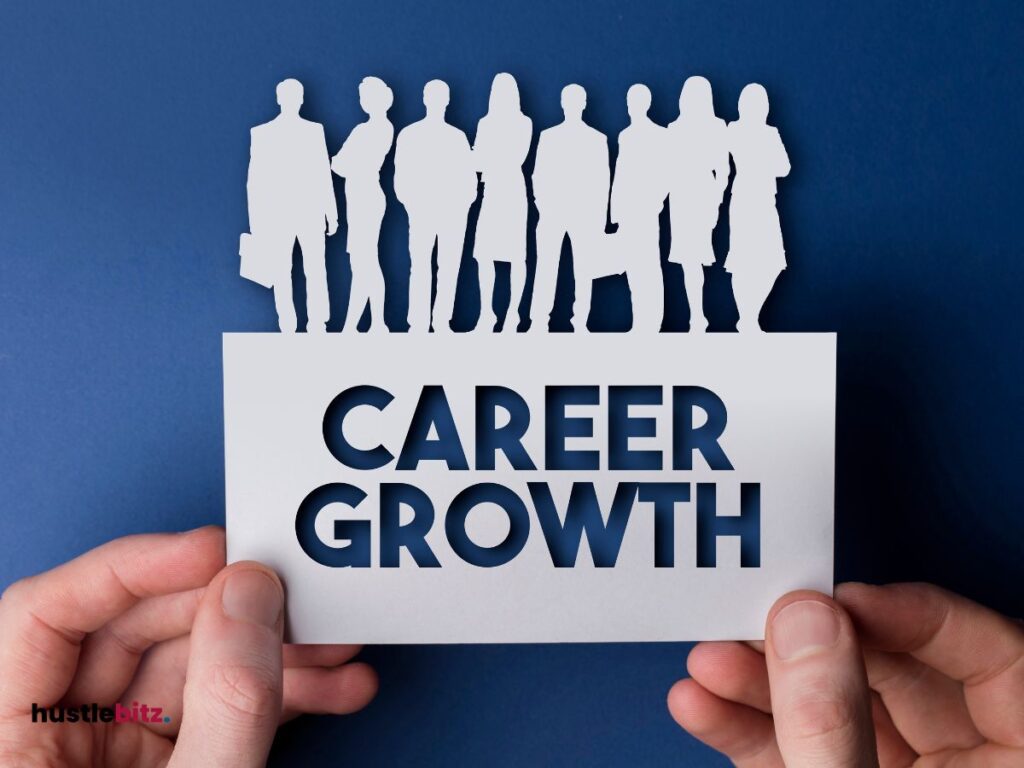The evolution of career advancement has transitioned from linear paths and long-term loyalty to a focus on adaptability and mobility. As individuals prioritize career agility, the gig economy and remote work have reshaped professional trajectories. Networking and personal branding are now essential for differentiation in a competitive market. Technological advancements require continual skill enhancement, making mentorship crucial for navigating changes. Furthermore, promoting diversity and inclusion fosters equitable growth opportunities. This multifaceted approach not only supports individual success but also aligns with organizational goals for long-term sustainability. Explore further to discover strategies for thriving in today’s evolving landscape.
Key Takeaways
- Career growth has transitioned from linear trajectories and organizational loyalty to prioritizing mobility and adaptability in a dynamic job market.
- Networking and mentorship are crucial for professional advancement, providing guidance and access to valuable industry insights and opportunities.
- A strong personal brand enhances visibility and trust, differentiating professionals in a competitive landscape through authenticity and storytelling.
- Continuous learning and skill assessments are essential for remaining relevant, enabling professionals to adapt to technological advancements and evolving industry demands.
- Diversity and inclusion strategies, including mentorship programs, foster equitable growth and innovation by embracing varied perspectives within the workforce.

Historical Perspectives on Career Growth

The evolution of career growth has historically been shaped by societal norms, economic conditions, and technological advancements, reflecting a dynamic interplay between individual aspirations and external influences.
In earlier decades, career trajectories were often linear, with employees expected to remain with a single organization throughout their working lives. This model was supported by a culture of mentorship opportunities, where seasoned professionals guided newcomers, facilitating skill acquisition through structured training and development programs.
As industries evolved, so too did workplace dynamics, with organizations increasingly recognizing the importance of professional development. Performance evaluations became essential tools for assessing employee growth and aligning individual objectives with organizational goals. This shift emphasized the role of job satisfaction, leading to initiatives that fostered a more engaging and supportive organizational culture.
The rise of technology and globalization in the late 20th century introduced new industry trends that reshaped the workforce. Lifelong learning became a necessity, as professionals were compelled to continuously update their skills to remain competitive in a rapidly changing job market. This imperative for ongoing education not only enhanced individual capabilities but also contributed to organizational adaptability.
Ultimately, the historical perspectives on career growth highlight the significance of adaptability and continuous improvement. The interplay of societal expectations, economic fluctuations, and technological innovations has fostered a landscape where career trajectories are no longer fixed but are instead shaped by proactive engagement with ongoing professional development.
This evolution underscores the necessity for individuals to navigate their careers strategically, leveraging available opportunities for growth and fulfillment.
The Shift From Loyalty to Mobility

As professionals increasingly prioritize career mobility over long-term loyalty to a single organization, the landscape of employment is transforming to reflect a more dynamic approach to career advancement. Job hopping is no longer viewed negatively; instead, it is often seen as a strategic move to enhance skill acquisition and gain diverse experiences. This shift emphasizes the importance of workplace flexibility and the ability to adapt to various environments.
Several factors contribute to this evolving mindset:
- Gig Economy: The rise of the gig economy has made it easier for individuals to take on multiple roles simultaneously, fostering a culture of short-term engagements rather than permanent positions.
- Remote Opportunities: With the proliferation of remote work, professionals can seek positions that align with their lifestyle and personal goals, enhancing their work-life balance.
- Professional Development: Organizations are increasingly investing in mentorship programs and continuous learning initiatives, allowing employees to pursue career fulfillment without being tethered to a single company.
Furthermore, this mobility-centric approach promotes employee well-being by enabling individuals to seek roles that better align with their values and aspirations. The focus on professional development and skill enhancement fosters a more resilient workforce capable of navigating the complexities of modern employment.
As the traditional notion of loyalty evolves, professionals are empowered to create careers that reflect their diverse interests and priorities, ultimately leading to greater satisfaction and success in their chosen fields.
Importance of Networking Today

Networking plays a crucial role in career advancement, serving as a catalyst for professional growth and opportunities in today’s competitive job market. Effective networking strategies are essential for navigating the complexities of various industries. Building and maintaining online connections through platforms like LinkedIn can extend one’s professional reach and foster valuable relationships.
Engaging with mentorship programs is another powerful avenue for personal and career development. These programs provide guidance from experienced professionals who can share insights and opportunities that may not be readily accessible. Additionally, joining professional associations can enhance credibility and offer access to exclusive industry events, where face-to-face interactions can lead to meaningful connections.
Social media has transformed traditional networking, allowing for virtual networking opportunities that transcend geographical limitations. By participating in online forums, webinars, and discussions, professionals can establish thought leadership and engage with peers, further enriching their networks. However, understanding networking etiquette is critical; maintaining a respectful and considerate approach fosters trust and strengthens relationships.
Alumni engagement also presents a unique networking opportunity. Former classmates often share similar experiences and can provide support, advice, or potential job leads. As professionals navigate their careers, relationship building should be a continuous effort, emphasizing the importance of nurturing these connections over time.
The Role of Personal Branding
A strong personal brand is essential for career advancement, distinguishing professionals in a crowded job market and highlighting their unique value propositions. By effectively managing their personal identity, individuals can cultivate a professional image that resonates with potential employers and clients. In today’s digital age, an online presence is crucial, as it serves as a platform for showcasing expertise and establishing credibility.
Here are three key aspects of personal branding that contribute to long-term success:
- Authenticity Matters: Authenticity fosters trust. By being genuine in their self-promotion strategies, professionals can connect more deeply with their audience, reinforcing their reputation management efforts.
- Visual Branding: Incorporating cohesive visual elements, such as logos and consistent color schemes, helps individuals stand out. This aspect of branding enhances recognition, making professionals memorable across various platforms.
- Storytelling Techniques: Effectively communicating one’s journey and experiences through storytelling can captivate an audience. By sharing personal narratives, professionals can demonstrate niche specialization and engage followers on social media, amplifying their influence.
In a world where social media influence is paramount, mastering these elements of personal branding is vital. Professionals must continually refine their online presence, ensuring it aligns with their career goals. By thoughtfully crafting a personal brand that reflects their values and expertise, individuals can navigate their career paths more effectively, ultimately achieving long-term success.
Adapting to Technological Advancements
The evolving landscape of technology requires professionals to adapt their skills and strategies, ensuring they remain competitive and relevant in an ever-changing job market.
As remote work becomes increasingly prevalent, mastering digital skills is essential. Professionals must embrace online learning platforms to stay updated and enhance their abilities. This shift toward continuous education fosters career agility, enabling individuals to pivot and respond to new opportunities or challenges swiftly.
Job automation has reshaped various industries, necessitating the acquisition of new competencies. Professionals should seek tech mentorship to navigate these changes effectively. Mentors can provide invaluable insights into emerging technologies and best practices, ensuring mentees are well-equipped to leverage AI tools in their work environments.
Moreover, the rise of remote leadership and the need for effective virtual networking cannot be understated. Building relationships in a virtual space requires a different skill set, including effective communication and emotional intelligence. Engaging in online professional communities can expand one’s network and open doors to new career advancements.
Regular skill assessments are vital in this technological landscape, helping professionals identify gaps in their knowledge and areas for improvement. By proactively addressing these gaps, individuals can position themselves as invaluable assets within their organizations, prepared to thrive in this dynamic environment.
Diversity and Inclusion in Career Paths

Promoting diversity and inclusion within career paths is essential for fostering innovation and enhancing organizational performance. Organizations that prioritize inclusive leadership not only reflect the workforce demographics of society but also harness the unique strengths of individuals with intersectional identities. By creating diverse pathways to advancement, companies can cultivate a collaborative environment that benefits everyone.
To effectively implement diversity and inclusion in career development, organizations should consider the following strategies:
- Mentorship Programs: Establishing mentorship opportunities that connect underrepresented employees with experienced leaders can enhance cultural competence and provide equitable opportunities for growth.
- Bias Awareness Training: Offering training sessions that address bias awareness helps create an environment where all voices are valued, and decisions are made fairly, thus improving overall representation.
- Inclusion of Diverse Perspectives: Actively seeking input from individuals of varying backgrounds can lead to innovative solutions and creative problem-solving, reinforcing the idea that representation matters.
Final Thoughts
The evolving career landscape presents both challenges and opportunities. As professionals navigate this dynamic environment, adaptability, continuous learning, and a strong personal brand are essential. Embracing new technologies, fostering valuable networks, and promoting diversity and inclusion not only enhance personal growth but also drive long-term organizational success. By remaining flexible and focused on skill development, individuals can achieve sustainable career advancement and thrive in the ever-changing job market.




